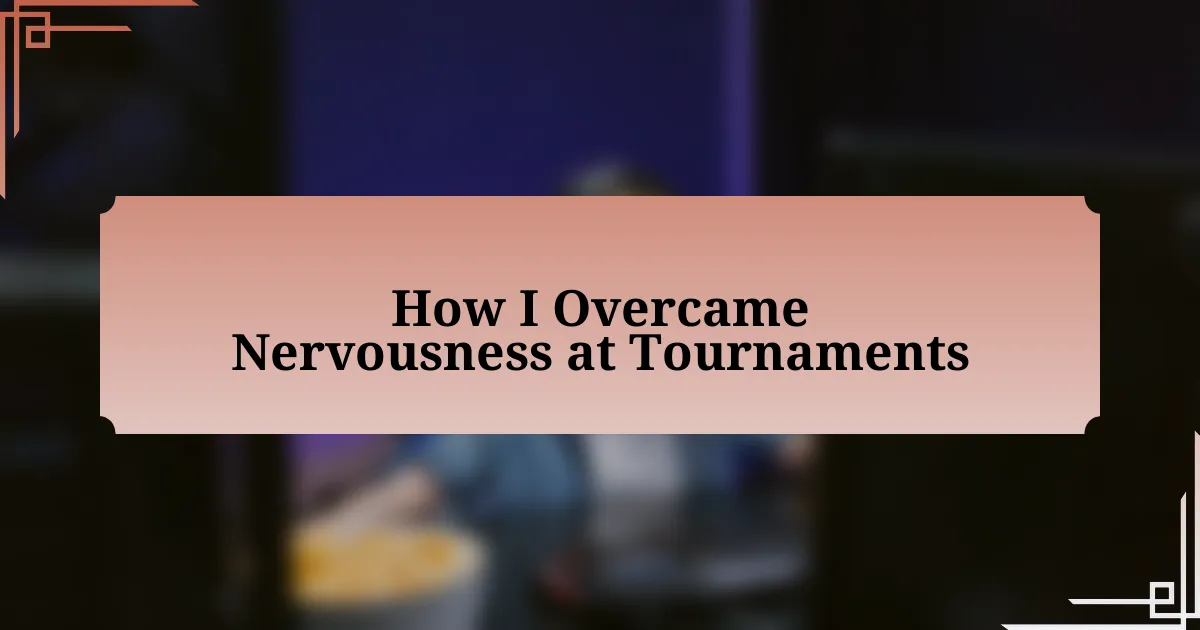Key takeaways:
- Nervousness in gaming affects performance through physiological responses and self-doubt, creating a cycle that can hinder gameplay.
- Effective strategies to manage nervousness include visualization, breathing exercises, and establishing a pre-game routine.
- Building confidence relies on practice, seeking feedback, and learning to view failures as opportunities for growth.
- Open communication with peers and setting realistic expectations can enhance the tournament experience and reduce anxiety.
Author: Evelyn Hartley
Bio: Evelyn Hartley is an award-winning author known for her compelling narratives and richly drawn characters. With a background in psychology and literature, she weaves intricate tales that explore the complexities of human relationships and the intricacies of the human psyche. Her debut novel, “Whispers in the Dark,” was celebrated by critics and readers alike, earning her a dedicated following. Evelyn’s work has been featured in various literary journals and anthologies, and she frequently speaks at writing conferences and workshops. When she’s not writing, she enjoys hiking in the mountains and volunteering at her local animal shelter. She resides in Seattle with her two rescue dogs, Luna and Milo.
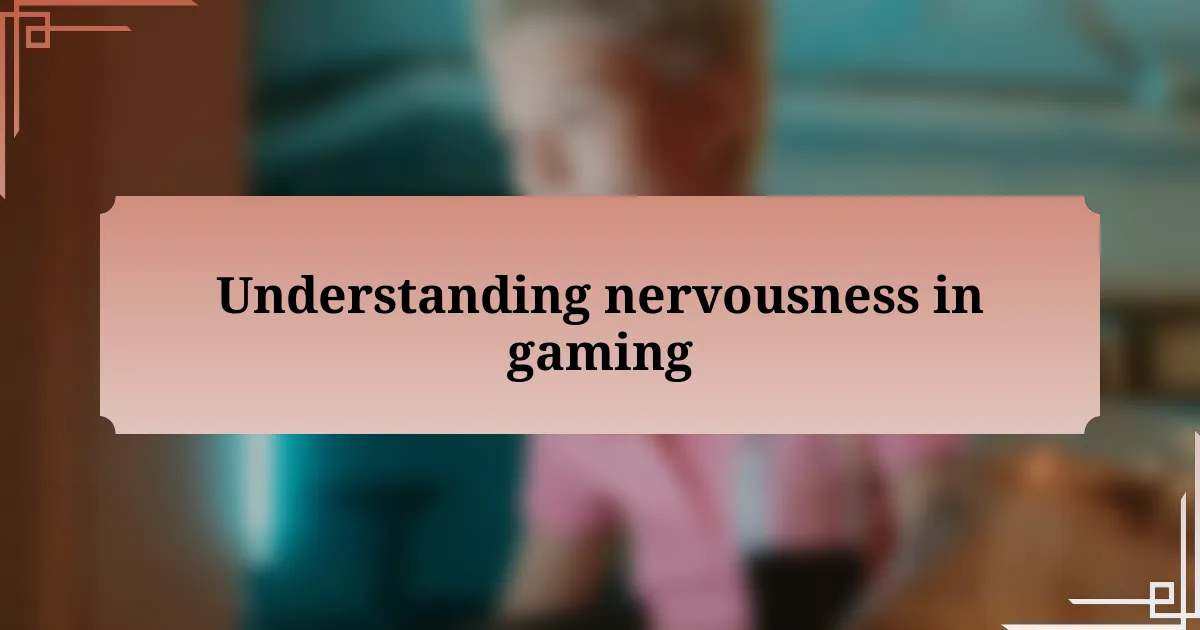
Understanding nervousness in gaming
Nervousness in gaming is a common experience that can hit even the best players. I remember my heart racing during a crucial tournament match, feeling like the weight of the world rested on my shoulders. Have you ever felt that same pressure just before a big play? It’s a whirlwind of thoughts and emotions that can either propel us to success or paralyze us with fear.
Many might not realize that nervousness isn’t merely a mental hurdle; it’s a physiological response too. Our bodies release adrenaline, making us alert but sometimes shaky. I once found myself staring at the screen, hands clammy and breathing shallow, questioning if I had trained enough. Have you had moments like that where self-doubt crept in?
Understanding this fear is the first step to managing it. I learned that acknowledging my anxiety—rather than fighting it—transformed my experience. When you accept these feelings as part of the journey, I promise it can make a world of difference in how you approach each match. How do you handle your nerves in the heat of competition?
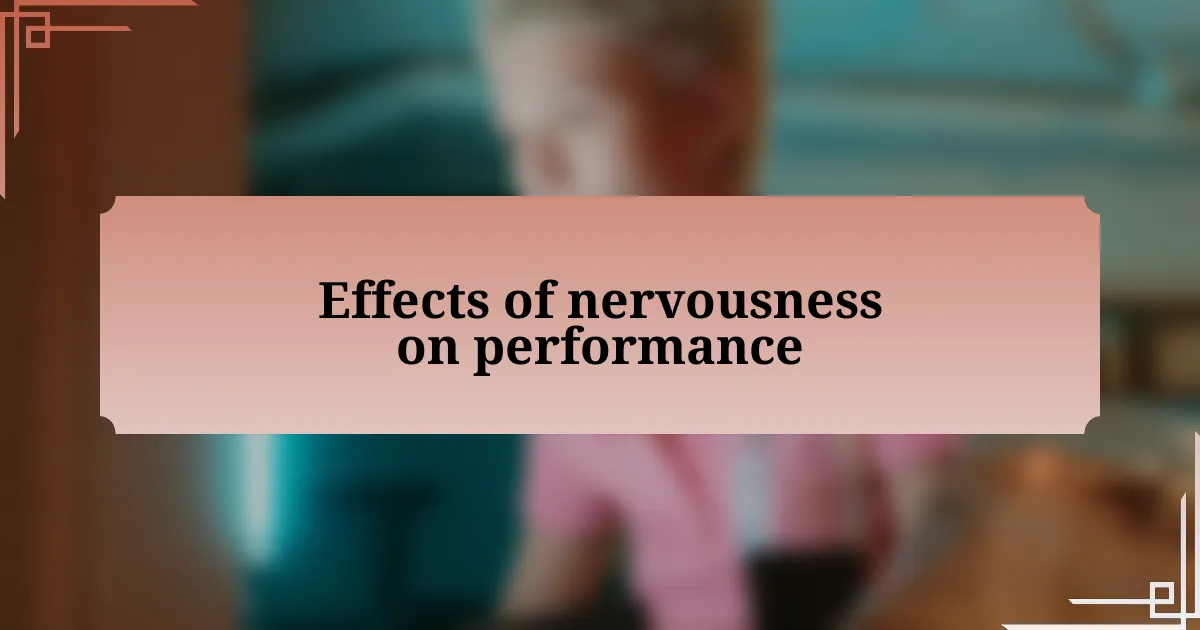
Effects of nervousness on performance
Nervousness can significantly impact performance during tournaments. I remember one time, during a highly competitive match, I miscalculated a vital move because my hands felt so unsteady. Have you ever had that moment when you know you can perform better, but nerves make you second-guess every decision?
When players grapple with nerves, it can trigger a cascade of errors. I can recall a situation where I missed a straightforward shot after fumbling with the controller, all because my mind was racing with “what ifs.” Those split-second hesitations can change the tide of a game, leaving players wondering how they let their emotions take control.
On a psychological level, nervousness can create a self-fulfilling prophecy. I found myself in a loop where the more worried I became, the more likely I was to underperform. It’s a frustrating cycle, isn’t it? Realizing this drew me closer to finding effective coping strategies instead of letting fear dictate my gameplay.
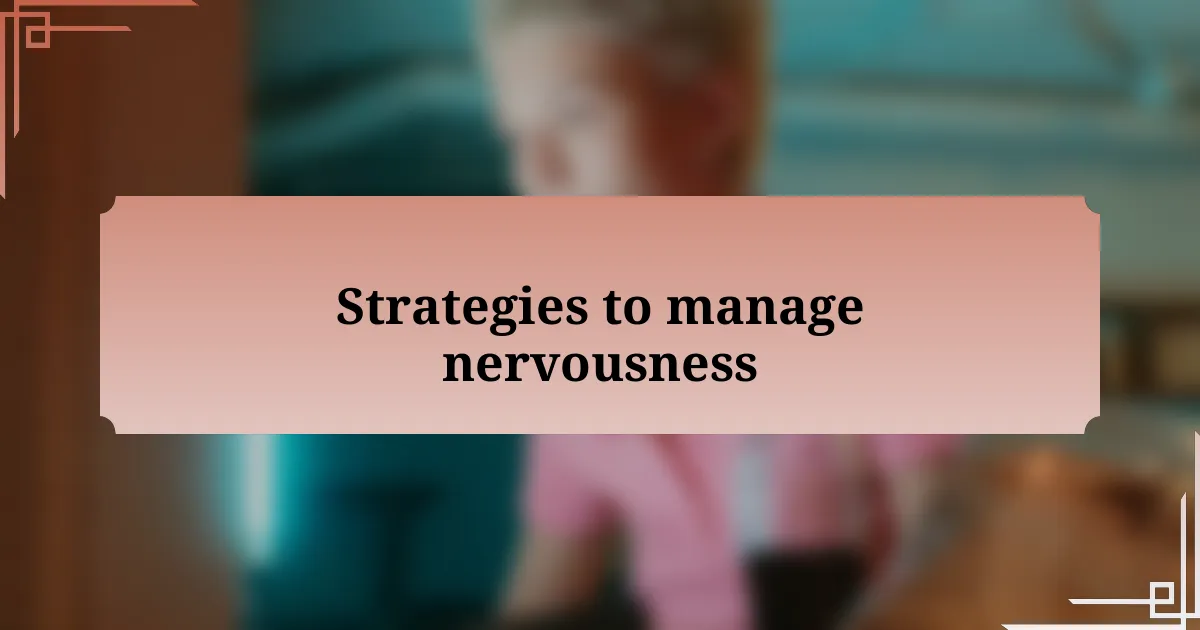
Strategies to manage nervousness
When it comes to managing nervousness, one technique that has worked wonders for me is visualization. Before a match, I often take a few moments to close my eyes and imagine myself executing my strategies flawlessly. Have you ever tried picturing a successful performance? It can create a sense of comfort and focus, almost like a mental rehearsal that eases the tension.
Breathing exercises are another invaluable tool in my arsenal. During high-stakes tournaments, I make it a point to pause and take slow, deep breaths. I’ve noticed that this simple act of grounding myself changes my physiological response, allowing me to regain my composure. Do you notice how just a few deep breaths can bring clarity in a chaotic moment? It’s surprising how effective such a basic technique can be in calming nerves.
Lastly, building a pre-game routine has become essential for me. I’ve started incorporating light stretches and quick chats with teammates to foster connection and ease anxiety. This routine signals my brain that it’s time to switch into game mode, transforming potential jitteriness into excitement. What habits have you found that help you enter a more focused mindset? Making this part of my preparation has not only reduced nervousness but also boosted my confidence level markedly.
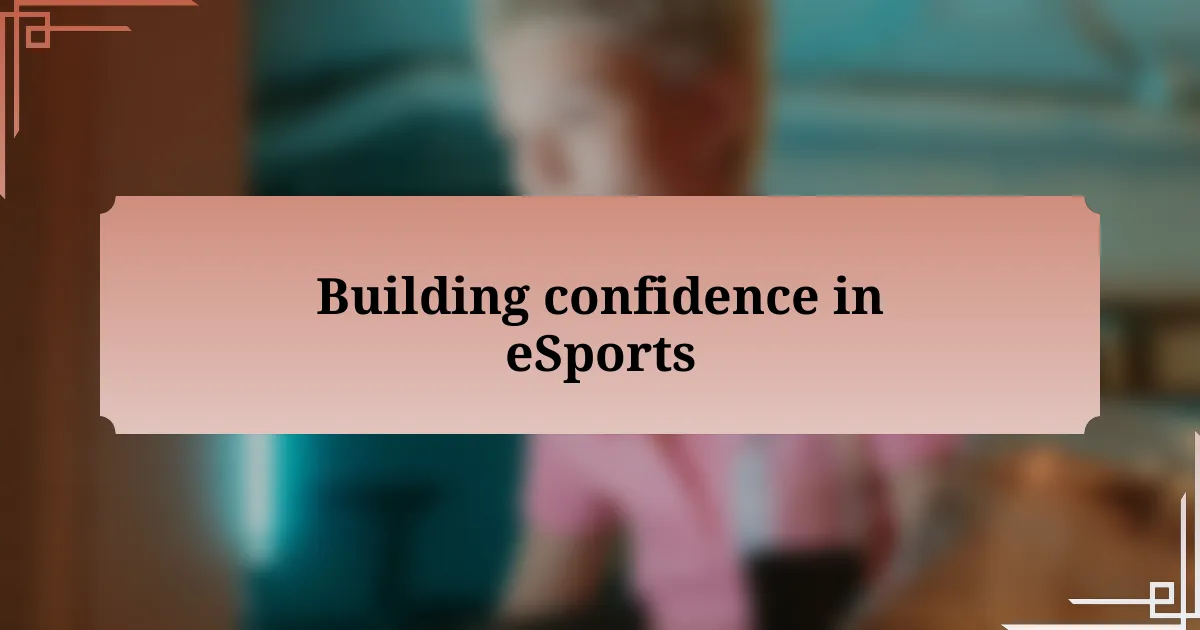
Building confidence in eSports
Building confidence in eSports often hinges on embracing the power of practice. I remember when I first started competing; I spent countless hours refining my skills, sometimes losing track of time. Have you ever immersed yourself so deeply in practice that it transforms into muscle memory? That’s the kind of dedication that builds a strong foundation, allowing me to step into the arena feeling prepared and self-assured.
Another approach that has significantly boosted my confidence is seeking feedback from teammates and coaches. Early on, I was hesitant to ask for input, fearing criticism. However, over time, I learned that constructive feedback is invaluable. By embracing it, I felt a sense of belonging and support that dispelled self-doubt. How often do you take the time to reflect on your gameplay with others? Sharing insights not only improves my skills but builds a network of encouragement that reinforces my self-belief.
Lastly, getting comfortable with failure is crucial in building confidence. I’ve had my share of tough losses that stung deeply. Still, I learned to view these moments as stepping stones rather than setbacks. Do you think of failures as opportunities for growth? Each defeat taught me vital lessons that made me a stronger player, reminding me that confidence is not just about winning; it’s also about resilience and learning from every experience.
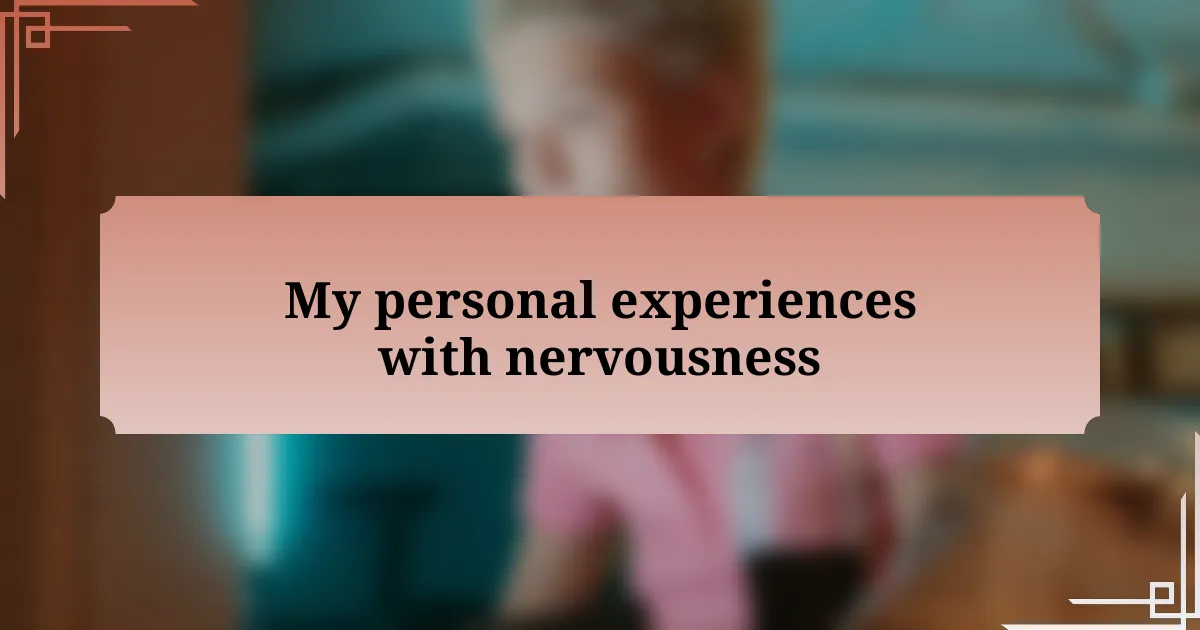
My personal experiences with nervousness
I vividly recall my first major tournament where the anxiety was almost palpable. As I sat backstage, I could hear the cheers and noise from the crowd. It overwhelmed me, and I remember thinking, “What if I fail in front of everyone?” That feeling of uncertainty almost kept me from stepping onto the stage, but I pushed through.
Another experience that stands out was during a match where the pressure mounted intensely. I can remember my hands shaking as I hovered over my mouse. It took a moment of deep breathing to center myself, reminding myself that I had practiced for this. Have you ever found that moment of clarity amidst chaos? That’s what helped me turn my nervousness into focus.
Looking back, I learned that nervousness is often just energy waiting to be channeled. I recall a particularly intense finals match; my heart raced, but I recognized that familiar flutter as a signal to harness my adrenaline. Does the thrill of competition excite you too? Transforming that nervous energy into motivation gave me the edge I needed to perform at my best.
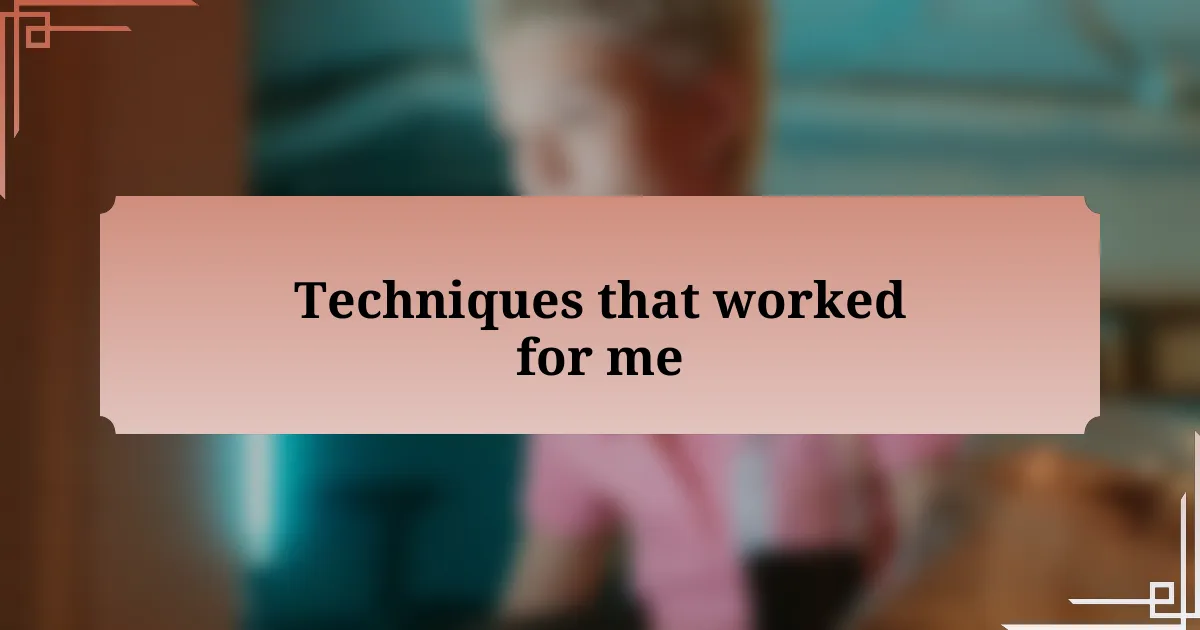
Techniques that worked for me
Finding techniques that effectively combat nervousness has been crucial for my success in tournaments. One strategy I adopted was visualization. Before a match, I’d close my eyes and picture myself succeeding—every move, every victory. This mental rehearsal made the game feel familiar and helped me shift my focus from fear to confidence.
Another technique that has proven invaluable is creating a pre-game routine. I established a set of actions I perform consistently before every tournament. This might include listening to my favorite music, doing light stretches, or even reviewing my favorite plays. Having this routine anchored me, similar to how athletes have a routine to get in the zone. Have you ever noticed how a small routine can change your mindset?
Lastly, I found that talking to fellow gamers helped tremendously. Sharing my worries and hearing about their experiences made me realize that I wasn’t alone in feeling nervous. In those moments, connecting with others transformed my anxiety into a shared experience, reminding me that we’re all striving for the same goal. Isn’t it reassuring to know that vulnerability can create strong bonds?
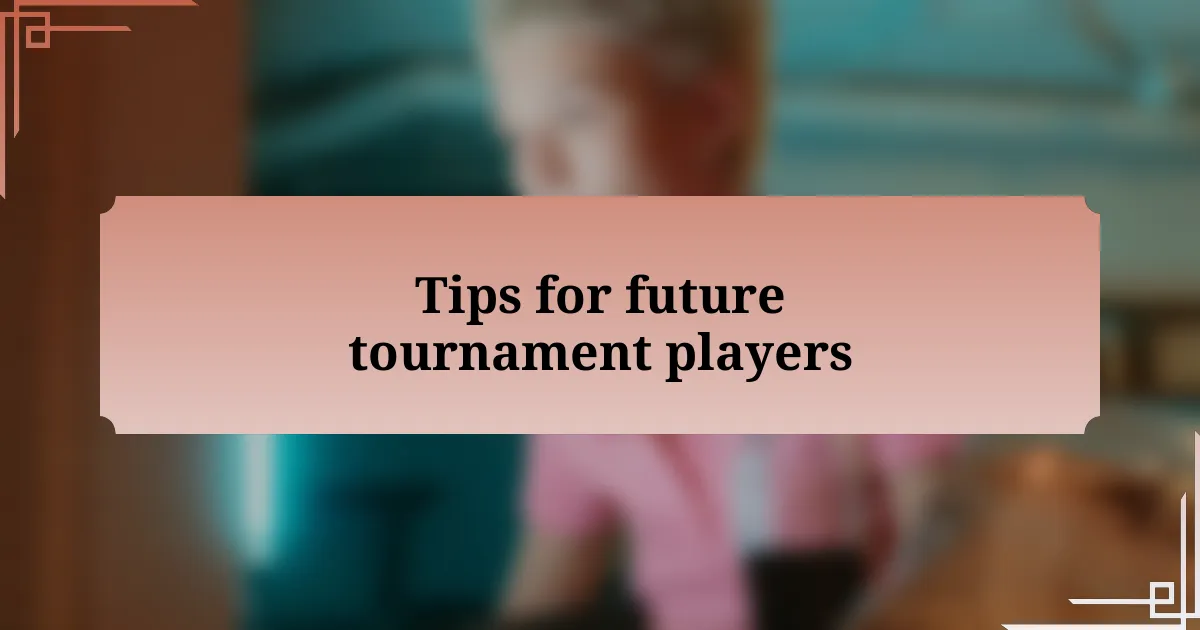
Tips for future tournament players
When preparing for a tournament, I can’t stress enough the importance of breath control. I remember a tense moment before a particularly challenging match when my heartbeat raced, and my hands felt clammy. Taking a few deep breaths helped center me, clearing my mind and allowing me to focus on my gameplay. Have you ever tried to just breathe and reset your thoughts in the heat of the moment?
Another valuable tip is to embrace open communication. Before my very first tournament, I reached out to more experienced players for advice. They shared their own stories of nerves and how they coped, which gave me a sense of belonging. Discussing our experiences not only eased my anxiety but also created a supportive atmosphere among players. Isn’t it amazing how sharing vulnerabilities can transform us from isolated competitors into a united community?
Lastly, I recommend setting realistic expectations for yourself. I learned this the hard way when I aimed for perfection in my first tournament, which only ramped up my nerves. By adjusting my goals to focus on personal improvement rather than winning, I found a more enjoyable experience. What outcome matters most to you—winning, learning, or simply enjoying the game? Remember, every match is a chance to grow, and that perspective can alleviate some pressure.

